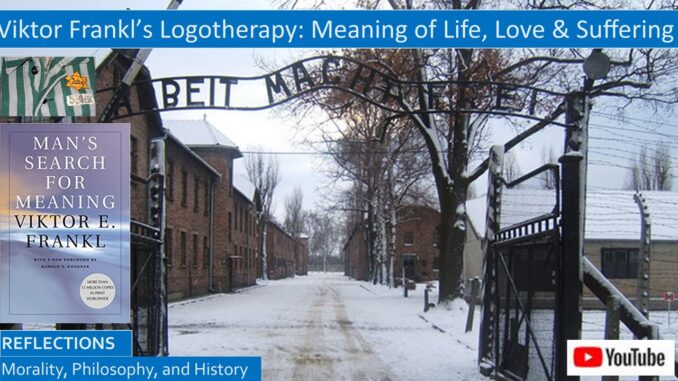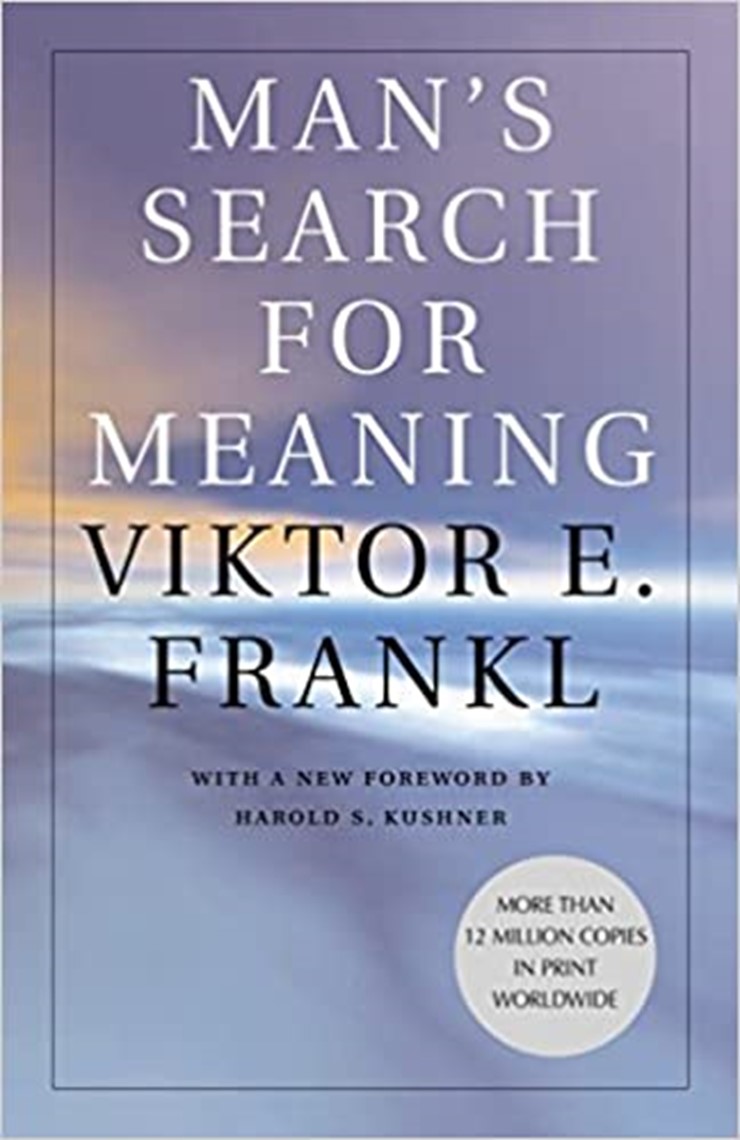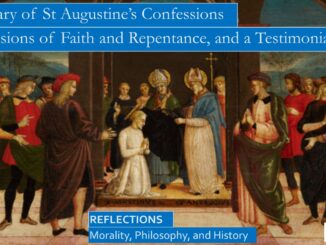
Viktor Frankl’s book, Man’s Search for Meaning, is a life-changing book and one of my favorites, it touched me deeply when I first read it many years ago. The main theme of the book is no matter what challenges you face in your life, or how busy you are, you always have time to be kind to all those whom you encounter, to be a positive influence on the lives whom you touch. Although he does not directly mention stoicism, his account of how he survived Auschwitz is a living example how a stoic mindset can help you survive and thrive through any challenge life may throw at you.
The first edition of his book described his “Experiences in a Concentration Camp.” Most of the Jews were sent directly to the showers, where they were gassed, but some Jews who were judged fit to work were sent to the work camps, where most still died from abuse, starvation, and overwork. Frankl tells us how he followed some advice as to which line to select, where the inmates were so thankful when water came out of their showers. We have many interesting details in our first video on his experiences in the work camps.
YouTube video for this blog: https://youtu.be/O-YtC9qGWPI
Frankl mentioned how his experiences shaped and influenced his views on psychology, and since many readers wanted to know more about his psychological system, he added another chapter, “Logotherapy in a Nutshell.”
Sigmund Freud thought that repressed sexual drives propelled our subconscious desires, but Viktor Frankl disagrees, his theory posits that Man’s Search For Meaning is what drives him. Frankl saw that this search for meaning is what kept people alive in the death camps.
What many laymen do not realize is that the detailed ideas of Sigmund Freud no longer have a major influence on current psychological practice. When you sample the history of psychology courses, such as the lectures by Professor Daniel Robinson of the Teaching Company, lectures on the Freudian theories are always among the beginning lectures. But if you listen to courses by practicing psychologists, even though they agree with that Freud and the earlier theorists that unconscious urges drive our feelings, modern therapists usually do not find that these early psychoanalytic theories are useful in clinical settings. Frankl observes that “the most common delusion of Freudian orthodoxy is that the durability of results corresponds to the length of the therapy.”[1]
Another reason for this disenchantment with Freudian theories is the discovery of the incredible effectiveness that Lithium and other similar drugs in treating schizophrenia and other mental illnesses. This discovery enabled the government to shrink and close many of the sprawling psychiatric hospitals, I have listened to lectures how so many psychologists were haunted by the memories of how they blamed supposedly dysfunctional mothers for the schizophrenia of their children.
Logotherapy was one of the classical psychological systems, where often the personality and life experiences of the founder of the movement influenced their theories profoundly. This was certainly true of Viktor Frankl, although he had formulated many of his theories during the interwar years as a practicing psychologist, his experiences in the death camps of Auschwitz definitely influenced his psychology. When he was in high school, Frankl wrote to Freud, who actually encouraged him to publish his ideas in a psychological journal before he graduated from high school![2]
There are not many psychologists today who claim to be logotherapists. However, Dr Wikipedia agrees with me that logotherapy is very similar to the modern CBT, short for Cognitive Behavioral Therapy. The founders of this therapeutic technique found Freudian analysis frustrating and not that useful, because many who seek counseling are often not mentally ill but are simply facing challenging life situations. CBT therapists are willing to talk about your family of origin if that is relevant to your current problems, but they are mainly interested in showing you how you can better cope with the life stresses you are currently facing. The Teaching Company, now Wondrium, has several series of lectures demonstrating how CBT works.
https://www.wondrium.com/cognitive-behavioral-therapy-techniques-for-retraining-your-brain
https://www.wondrium.com/cognitive-behavioral-therapy-for-daily-life
Although I did not pick up on this when listening to these courses, the founders of CBT drew many of their core concepts from classical stoicism, and we have many lectures on stoicism.
https://youtu.be/Dhd543kov-E and https://youtu.be/wgD8skYi3I0 and https://youtu.be/-uQxq1O9xSY and https://youtu.be/0qHpReZYhv4
One good example of this practical approach is when Frankl describes a former patient who was a high-ranking diplomat. This patient was frustrated with his current psychoanalyst, they had spent years in psychoanalysis exploring whey he was dissatisfied with both his career and the direction of American foreign policy. His prior psychoanalyst was having him explore unresolved conflicts with his father as a remedy. When this patient explored with Frankl his feelings, Frankl thought that the patient had some valid concerns, so Frankl simply asked him, Why not change professions? Which he was able to do, and as a result his new line of work was much more gratifying.
As Frankl tells us, “Not every conflict is necessarily neurotic; some amount of conflict is normal and healthy.” “A man’s concern, even his despair, over the worthwhileness of his life is an existential distress but by no means a mental disease. It may well be that interpreting the first in terms of the latter motivates a doctor to bury his patient’s existential despair under a heap of tranquilizing drugs. It is his task, rather, to pilot the patient through his existential crises of growth and development.”[3]
“So, if therapists wish to foster their patients’ mental health, they should not be afraid to create a sound amount of tension through a reorientation toward the meaning of one’s life.”[4]
What was the innermost drive for concentration camp prisoners? Was sex the innermost drive, as Freud taught?
Viktor Frankl asks,
“What did the prisoner dream about most frequently?”
He dreamed of “bread, cake, cigarettes, and warm baths.”
“The lack of these simple desires led to their wish-fulfillment in dreams.”[5]
Frankl tells us of the most important lesson he relearned in the Nazi concentration camps: “The truth is that love is the ultimate and highest goal to which man can aspire.” In the suffering of the camps, Frankl tells us that he realized that “the salvation of man is through love and in love. I understood how a man who has nothing left in this world still may know bliss, be it only for a brief moment, in the contemplation of his beloved. In a position of utter desolation, when man cannot express himself in positive action, when his only achievement may consist in enduring his sufferings in the right way, an honorable way, in such a position man can, through loving contemplation of the image he carries of his beloved, achieve fulfillment.”[6]
This following advice I have found helpful, because often in life, especially at work, you are really not allowed to have problems, you are not allowed to show weakness, you are there to work and make money for the company, you are expected always to have the positive mental attitude and be bubbly and happy and fun to be around.
After a few weeks at Auschwitz, a colleague of Viktor snuck into his barracks with advice. “Shave daily, with glass if you have to.” “If you want to stay alive, there is only one way: look fit for work. If you even limp, because of a blister on your heel, and an SS man spots this, he will wave you aside to be gassed. Do you know what we mean by a ‘Moslem’? This is a man who looks miserable, down and out, sick and emaciated, and who cannot manage hard physical labor any longer. Sooner or later, usually sooner, every ‘Moslem’ goes to the gas chambers. Therefore, remember: shave, stand and walk smartly; then you need not be afraid of the gas.” And the most important advice: “Do not be conspicuous.”[7]
Those prisoners with a rich inner spiritual life were more likely to survive. Viktor Frankl remembers, “In spite of all the enforced physical and mental primitiveness of life in a concentration camp, it was possible for spiritual life to deepen. Sensitive people who were used to a rich intellectual life may suffer more pain, but the damage to their inner selves was less. They were able to retreat from their terrible surroundings to a life of inner riches and spiritual freedom. Only in this way can one explain the apparent paradox that some prisoners of a less hardy make-up often seemed to survive camp life better than those who were more robust.”[8]
Viktor tells us, “The experiences of camp life show that man does have a choice of action. Apathy can be overcome; irritability can be suppressed. Man can preserve a vestige of spiritual freedom, of independence of mind, even in terrible conditions of psychic and physical stress.”[9] No matter how dire your circumstances, you can always be kind to those around you.
FOCUS OF LOGOTHERAPY
Frankl tells us, “Logotherapy focuses on the future, on the meanings to be fulfilled by the patient in his future.” “Man’s search for meaning is the primary motivation in his life and not a ‘secondary rationalization’ of instinctual drives.
Frankl views Logotherapy as more a training process. This is reminiscent of the teachings of the monastic Church Fathers, that life is a matter of fostering healthy habits that improves you as a person, which is really self-training, as well as listening to and following the advice of your spiritual guide, or your logotherapist. Frankl says that traditional psychoanalysis focuses on the past, on past experiences that may have warped their perception of the world, so that that psychoanalyst asks their patient to lay down on a couch to reveal memories that are disagreeable to tell. In contrast, logotherapy focuses on the future, on what meaning the patient should seek in his life, so that the logotherapist asks that their patient remain sitting erect so they can hear advice that is disagreeable to hear.[10]
Frankl says, “Logotherapy ties to make the patient fully aware of his own responsibilities; therefore, it must leave to him the option for what, to what, or to whom he understands himself to be responsible. That is why a logotherapist is the least tempted of all psychotherapists to impose value judgments on his patients, for he will never permit the patient to pass to the doctor the responsibility of judging.”[11]
This reminds us of the Prayer of St Ephrem:
O Lord and Master of my life,
take from me the spirit of sloth, despair, lust of power, and idle talk.
But give rather the spirit of chastity, humility, patience, and love to Thy servant.
Yea, O Lord and King, grant me to see my own transgressions,
and not to judge my brother,
for blessed art Thou, unto ages of ages. Amen.[12]
Frankl adds that you should have the patient realize what they need to do rather than telling them what to do. Frankl explains, “Logotherapy is neither teaching nor preaching. It is as far removed from logical reasoning as it is from moral exhortation.” “The logotherapist’s role is to broaden the patients view so the whole spectrum of potential meaning becomes conscious and visible to him.”[13]
MEANING OF LIFE, LOVE, AND SUFFERING
Frankl believes that “the true meaning of life is discovered in the world rather than in man or in his own psyche, as though it were a closed system.” “The more one forgets himself, by giving himself to a cause or another person to love, the more human he is and the more he actualizes himself.”
How can we discover the meaning of life? “According to logotherapy, we can discover this meaning in three different ways:
- By creating a work or doing a deed.
- By experiencing something, such as goodness, truth and beauty, in nature or culture,
- Or encountering someone, by experiencing another person in his very uniqueness, by loving him.
- By the attitude we take toward unavoidable suffering.”
What is the meaning of love? Frankl suggests, “Love is the only way to grasp another human being in the innermost core of his personality. No one can become fully aware of the very essence of another human being unless he loves them. By his love he is enabled to see the essential traits and features in the beloved person;” both their obvious strengths, and also their potential strengths, strengths hidden that blossom with encouragement, like flowers that bloom after it rains.
This attitude is expressed when the Judeo-Christian tradition exhorts us to the two-fold Love of God and neighbor. All of life, all of scripture should be lived with this two-fold Love in mind. All Scripture exhorts us to this two-fold love, but the phrase was coined by St Augustine.
In particular, St John of the Cross speaks of this two-fold Love of God and neighbor when he teaches us that we should choose those to be close friends, and you can argue spouses and lovers, as those who increase in us our Love of God, our love of truth and kindness.
Likewise, Frankl reminds us that love is not sex, but healthy intimacy is an expression of love.[14] “Pleasure is, and must remain, a side-effect or by-product” of romantic love, “and is destroyed and spoiled to the degree to which it is made a goal in itself.” In this delightful book, Tobias and Sarah pray before their first night as newlyweds.
In the Hebrew and in the transliteral translations of Leviticus, there are multiple commandments that say THOU SHALT NOT UNCOVER THE NAKEDNESS OF anyone who is not your wife, and this is not a doctrinal issue since these same commandments in Exodus use concise words that are similar to English usage that mean having sex with, in more or less vulgar or clinical terms. This language in Leviticus emphasizes that even illicit and immoral physical relationships can lead to either deep emotional attachments, or deep emotional resentments, and trauma, so we always prefer to use the phrase, being physically intimate, because this also suggests that the cousin of physical intimacy is emotional intimacy in a caring relationship.
We discussed this and other similar topics in our video explaining our personal philosophy, which parallels our channel philosophy.
Many of the monastic works of the Eastern Church Fathers discuss that those who truly love their neighbor act selflessly rather than selfishly, particularly the works of St Maximus the Confessor in the Philokalia, who also teaches us that because we love our neighbor, we should be eager to forgive our neighbor his faults, and his transgressions against us.
What is the meaning of suffering? Frankl posits that “man’s main concern is not to gain pleasure or to avoid pain but rather to see a meaning in his life. That is why man is even ready to suffer, on the condition that his suffering has meaning.” [15]
From a stoic perspective, if you strive to live a godly life, this question is simply absurd. If you seek to live a godly life, often you will be happy, but sometimes not. The question is not whether suffering has meaning, but whether, with God’s help, you can endure the suffering, enduring your suffering gracefully, without rancor, without bitterness.
Many of Frankl’s observations are compatible with stoic philosophy, particularly the philosophy of Epictetus, who said that a tyrant may take everything you own and enslave you, but he can never take away your inner freedom or your soul.
Epictetus says this: “Are you not scorched by the sun? Are you not pressed by the crowd? Are you not wet when it rains?” Has not the Lord granted you the strength to endure all the trial life may bring? “Have you not received greatness of soul? Have you not received manliness? Have you not received endurance? Why trouble yourself about anything if you possess greatness of soul?” What should our attitude be when facing life’s difficulties? Should we cower like cowards in the face of adversity? Do not cower, “bring now, O Lord, any difficulty that thou pleases,” for You have given me the means and power to bring honor to myself through the difficulties I endure.” [16]
Frankl explains that logotherapy was not therapy in the traditional sense, in that there was no mental problem, only a life problem that needed to be endured, all Frankl could hope to do is help the patient reflect on how he could change his attitude.[17]
In a case study that illustrates this, Frankl said he had an elderly patient who was severely depressed because his beloved wife, for whom he lived for, had died several years before.
Frankl asked him, “What would have happened if you had died first, and your wife would have had to survive you?”
The patient answered, “For her this would have been terrible, how she would have suffered!”
Frankl replied, “You see, your suffering has spared her this suffering, but at the price that you have to survive and mourn her.” Frankl remembers how the patient shook his hand and calmly left his office. Frankl observes, “Suffering ceases to be suffering at the moment it finds a meaning, such as the meaning of a sacrifice.”
Frankl decries that “our current mental hygiene philosophy stresses the idea that people ought to be happy, that unhappiness is a symptom of maladjustment. Such a value system means that the burden of unavoidable unhappiness is increased by unhappiness about being unhappy.” On the contrary, we will all face unhappiness, we will all have loved ones who depart, we will all face challenges when we are rejected, maybe divorced, many fired from our jobs. Frankl encourages us to view our suffering as ennobling rather than degrading.[18]
I am just not obligated to have a positive mental attitude every minute of my life, I am allowed to wallow in my misery from time to time, but never for very long. Sadness is part of life, just don’t welcome or wallow in your sadness.
EXISTENTIAL VACUUM OF MODERN LIFE
Frankl describes the existential vacuum that modern man experiences, but which I think has been encountered by all men who in the past, as everyone historically sees himself as modern, with the difference that the ancients embrace tradition more firmly, while modern men must tolerate the change that technological advances have thrust upon us.
Only man can fear the future with dread, because only man is not ruled primarily by instinct, only man can sense that his actions today have consequences tomorrow, not to mention the unfair consequences suffered because of the bad or evil choices made by others. Only man fears the uncertainties of his future.
Frankl explains, “No instinct tells man what he has to do, no tradition tells man what he ought to do; sometime man does not even know what he wishes to do. Instead, he either wishes to do what other people do, he seeks to conform; or he does what other people wish him to do, which can lead to totalitarianism.”[19] Or I might add, after much reflection our noble man may choose a brave new path, and seek to establish a new normal, rejecting that path most others choose to follow, seeking a more virtuous path, which can also be a lonely path..
Frankl states that “the existential vacuum manifests itself in a state of boredom,” or sometimes distress. We work for the weekend, and when the weekend comes, we search for something to do. Shouldn’t life be more than the weekends? What is worse, what are we going to do once we retire? Does our life really have purpose?
Frankl elaborates, “there are various masks and guises under which the existential vacuum appears. Sometimes the frustrated will to meaning is vicariously compensated for by a will to power, including the most primitive form of the will to power, the will to money. In other cases, the place of frustrated will to meaning is taken by the will to pleasure,” often selfish sexual pleasure.[20]
When in the death camp, once he tried to encourage his fellow prisoners to patiently endure the unbelievable suffering that they had to endure to survive. “I asked the poor creatures who listened to me attentively in the darkness of the hut to face up to seriousness of our position. They must not lose hope but should keep their courage in the certainty that the hopelessness of our struggle did not detract from its dignity and its meaning. I said that someone looks down on each of us in difficult hours, a friend, a wife, somebody alive or dead, or a God, and he would not expect us to disappoint him. He would hope to find us suffering proudly, not miserably, knowing how to die.”[21]
Who survived the camps? Frankl tells us that “on the average, only those prisoners could keep alive who, after years of trekking from camp to camp, had lost all scruples in their fight for existence; they were prepared to use every means, honest and otherwise, even brutal force, theft, and betrayal of their friends, in order to save themselves. We who have come back, by the aid of many lucky chances or miracles, whatever one may choose to call them, we know: the best of us did not return.”[22]
FRANKL’S LIFE AFTER THE CAMPS
Before the war, Viktor Frankl had remained in Germany to take care of his elderly parents, even though he could have emigrated. After the war he learned that not only did his wife perish in the death camps, but his parents and his brother also died in the camps, though his sister had escaped to Australia. He was alone, he and his sister were the only ones in his family who survived.
When so many Jews in his position emigrated, why did Frankl remain in Vienna, Austria?
In the afterword, Dr Winslade says, “Frankl felt an intense connection to Vienna, especially to psychiatric patients who needed his help in the postwar period. He also believed strongly in reconciliation rather than revenge; he once remarked, ‘I do not forget any good deed done to me, and I do not carry a grudge for a bad one.’ Notably, Frankl renounced the idea of collective guilt. Frankl was able to accept that his Viennese colleagues and neighbors may have known about or even participated in his persecution, and he did not condemn them for failing to join the resistance or die heroic deaths.”
When Jews returned to their old homes, often they found that others had moved in, and quite often they refused to leave what they saw as their home. We do not know what the post-war Austrian policy was in these situations, this passage suggests that Frankl had moved into his old house, or at least found another in his old neighborhood.
Dr Winslade continues, “Instead, Frankl was deeply committed to the idea that even a vile Nazi criminal or a seemingly hopeless madman has the potential to transcend evil or insanity by making responsible choices.”[23]
[1] Viktor Frankl, Man’s Search for Meaning, p. 127.
[2] Viktor Frankl, Man’s Search for Meaning (Boston: Beacon Press, 2006, 1959), pp. 156-157.
[3] Viktor Frankl, Man’s Search for Meaning, pp. 101-103.
[4] Viktor Frankl, Man’s Search for Meaning, p. 105.
[5] Viktor Frankl, Man’s Search for Meaning, pp. 28-30.
[6] Viktor Frankl, Man’s Search for Meaning, pp. 37-38.
[7] Viktor Frankl, Man’s Search for Meaning, p. 19.
[8] Viktor Frankl, Man’s Search for Meaning, p. 36.
[9] Viktor Frankl, Man’s Search for Meaning, p. 65.
[10] Viktor Frankl, Man’s Search for Meaning, p. 98.
[11] Viktor Frankl, Man’s Search for Meaning, pp. 109-110.
[12] https://www.oca.org/orthodoxy/prayers/lenten-prayer-of-st.-ephrem
[13] Viktor Frankl, Man’s Search for Meaning, p. 110.
[14] Viktor Frankl, Man’s Search for Meaning, pp. 110-112.
[15] Viktor Frankl, Man’s Search for Meaning, p. 122.
[16] https://www.biblegateway.com/passage/?search=romans+5%3A3-5&version=NRSVCE
[17] Viktor Frankl, Man’s Search for Meaning, pp. 112-113.
[18] Viktor Frankl, Man’s Search for Meaning, p. 114.
[19] Viktor Frankl, Man’s Search for Meaning, p. 106.
[20] Viktor Frankl, Man’s Search for Meaning, p. 107.
[21] Viktor Frankl, Man’s Search for Meaning, p. 83.
[22] Viktor Frankl, Man’s Search for Meaning, pp. 5-6.
[23] Viktor Frankl, Man’s Search for Meaning, p. 163 and https://en.wikipedia.org/wiki/Viktor_Frankl





3 Trackbacks / Pingbacks